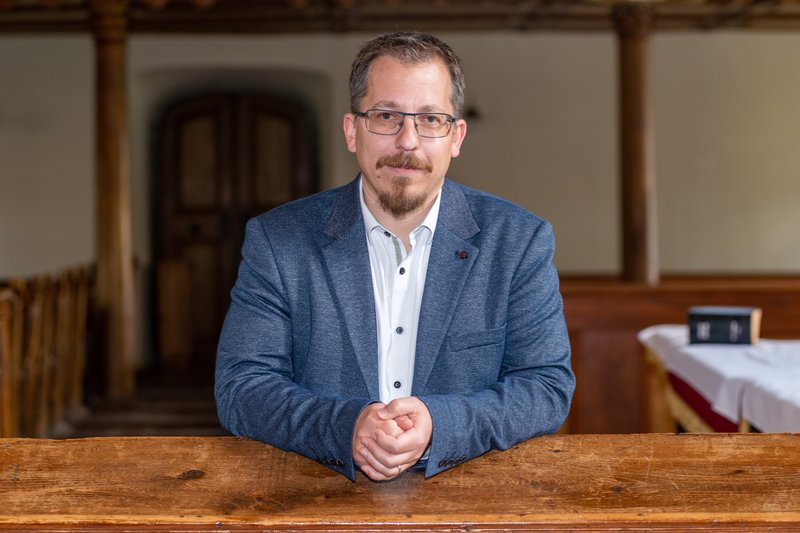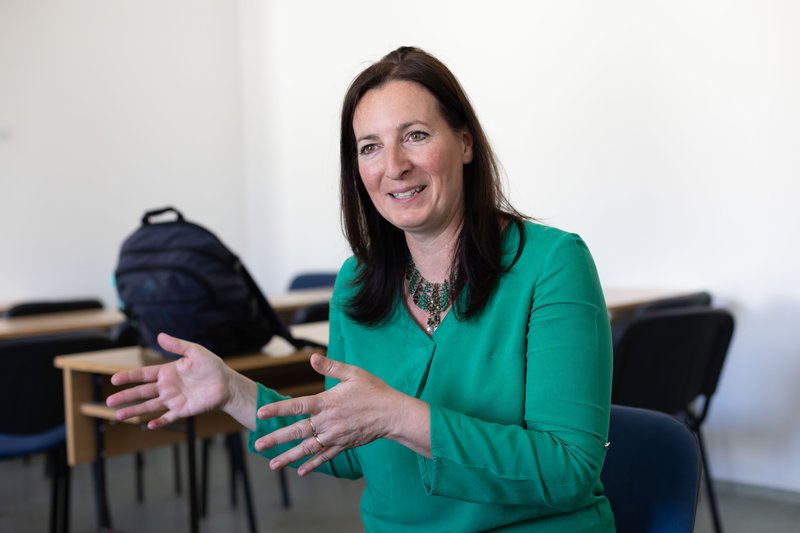The chimneys are filled with the smoke of wrapping paper and plastic strapping thrown on the boiler, the dustbin full of what we cannot fit into it... If we celebrate Christ, it is worth looking behind the way we do it: what we really do to glorify Him and what we do to contradict His teaching. Is a Christmas pleasing to God when we overspend, when we overextend ourselves, when we place a burden on the created world that it cannot bear? Families and congregations alike should reflect on their habits.
Not To Play Against Each Other God and Man
One of the people I spoke to, Pastor Áron Kocsis from Hajdúnánás says that if we talk about the protection of creation, we have to look further back than the story of Christmas. “Already in the first pages of the Bible, in the Old Gospel, God speaks of someone coming to bite the head off the serpent, even though it bites its heel. A dweller who will settle everything. The promise of orderliness is already there at the dawn of life, of the existence of the world. This is in keeping with the great task of cultivating and preserving this created world until redemption comes, he explains in the light of the Word.
According to Áron Kocsis, it is not good to pit divine care and human responsibility against each other: we do not want to create a new creation to legitimize irresponsible lifestyles, nor do we want to take on the burden of cultivation and all its burdens as eco-anxiety patients. The latter is a great test of our faith in Providence. One of Jesus' statements is that He counts the smallest bird and the hair of our head. We must do our duty, man is entrusted with the created world, we must live with it and not take it back. “If I am anxious that everything here is coming to an end, it seems more like a mere worldly grasp than a transcendent perspective of faith. We must always keep the duality: we have a heavenly citizenship, but also a mandate to sustain creation. It is not either-or; but also,” explains the pastor. In his incarnation, Jesus renounced the riches and power of heaven, can we follow his example and celebrate this with serenity or at least moderation?

Litmus Paper Festivity
Rev. Kocsis believes that Christmas is a good litmus test of how responsibly we use our resources, how seriously we take the task God has given us to use our energy, our material resources and our potential. “The ethical part of this can be measured in simple things like what kind of tree should I buy, whether I recycle, what kind of food I eat, how far I travel - unless I use a sustainable mode of travel like Mary and Joseph or the wise men of the sunrise,” he adds with a smile.
The resources that a church uses, even in its diaconal service, are a crucial consideration. “We also make packages, both for inland and foreign beneficiaries, with products produced in Hajdúnánás. We donate the goods of local small farmers and producers, not multinationals. Snail noodles and jam can be good, because they can be made in the congregation,” the pastor adds. Plus, they have a double magic: they involve you in the community when they're made, and they help where they reach.
Christmas tree choices: living, cut or artificial
For many years there was a debate about which pine to choose. The argument in favour of artificial pine is that it will serve for many years, but its production and destruction are equally damaging. The argument in favour of pine from the ground is that it can be planted, but in a warm room, only a small proportion of pines that have been dried are viable. Boglárka Szűcs, coordinator of the Eco-congregation movement of RCH and researcher at the Research Institute for Creation Protection at the Faculty of Humanities of the Károli Gáspár University of RCH, on the other hand, echoes Diána Ürge-Vorsatz, saying that the latest research finds that the larger the cut pine, the better, because it cooperates with fungal growth for many years, binds water in the soil, helps biodiversity and the forests not to shrink, and last but not least, it helps Hungarian farmers to make a living by buying it.
According to Boglárka Szűcs, if we get stuck on selective waste collection, we haven't done much. “A systems approach is key: see the whole cycle in the life of a product. Where it is made, where it is transported, how long it is used, whether it can be recycled... This way, even when we buy, we can make sure that we only buy what we need and use it as long as possible. This approach should also be applied in our churches. Let us not give ourselves false comfort that we have managed our waste. Separate collection is a scarred process, as it requires energy, often new raw materials, to produce new material, which means it is not sustainable," she points out.

Every Purchase is a Vote
She admits that a few congregations are not enough to make manufacturers rethink both how they make their products and how they package them, but with each person comes the understanding that has led to more than one successful food boycott, so the power of our abstinence from buying cannot be understated. “It is only our needs that need to be met, not our desires, which are artificially stimulated by well-crafted advertising. Because every purchase is a vote for the livelihood of a multinational company or even a Hungarian family. Is it not better to buy food by supporting someone I know? Hungarian consumers are particularly price-sensitive, which is why we are often tempted by promotions. Unfortunately, the prices of local producers are often not competitive with those of mass producers. It's wonderful if you can still choose local producers. And if we do have to opt for mass production, we should at least look at where the product comes from. A good example is garlic, which, although it is grown in Hungary, is imported from Asia by the big supermarket chains.”
It Does Matter What Kind of Paper …
The most common waste generated in churches is office paper. She says it's a valuable resource, but we've already done a lot if we only throw it away when we've used both sides. “Paper printed with plain black ink can be recycled well. Colour is more difficult to handle, requiring more chemicals and intervention. So if you're not printing in colour, you've already done something. But the biggest problem is Christmas wrapping paper, because the shine achieved with metallic vapour makes it impossible to process. Paper would be a useful waste product, but once treated in this way it cannot be separated from other materials”. This is why Boglárka Szűcs recommends the most natural paper possible, or even better, textiles. Or a system where we re-collect them and give the same to the children's church gift next year.
“The UK has the most accurate data, estimating that the amount of packaging material consumed at Christmas is enough to wrap the earth nine times. According to Eurostat, 100,000 tonnes of wrapping paper are used in Europe every year. And this is the most spectacular example of a waste of resources, as it only lasts until we unwrap the present. But there are so many other things that we can offer as gifts that don't need to be wrapped and have no problem being produced or treated as waste: for example, adopting a pet, i.e. something that is also a donation. But if you give an experience - a RCH’s Star Point Youth Festival pass, a swimming pool pass - you don't give based on objects or products.”
Discarded Food
“We are perhaps a little more prudent in terms of food waste by European standards, but we have a lot more to do in terms of food saving. Planning can help a lot. If we are impulse shoppers, going to the shops without a shopping list or a menu plan, we are guaranteed to overbuy and have food left over. You can do a lot by thinking ahead and learning about food saving organisations and apps," recommends Boglárka. Adding that “shockingly, we are unfortunately also leading the way in food credit at this time of year, which is completely at odds with the Max Weberian Protestant ethic. Our moderation should also manifest itself on our holidays!”
Originally published in the Reformátusok Lapja, the weekly magazine of RCH.